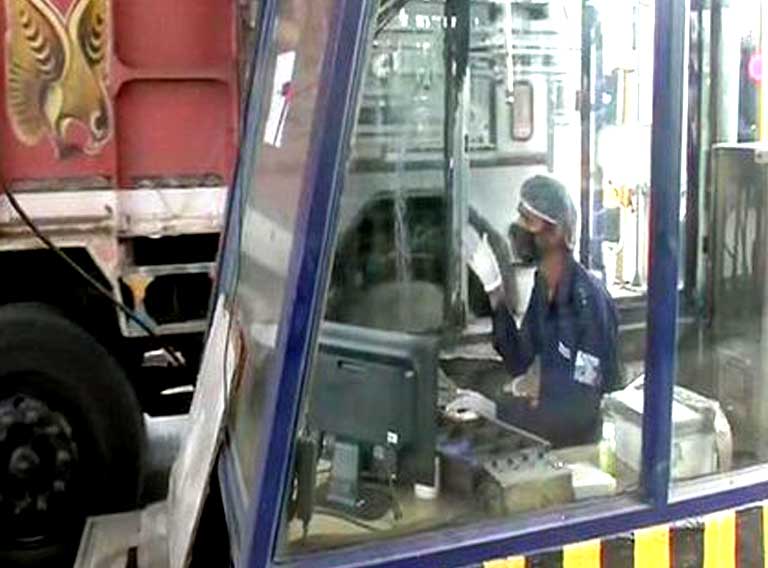Harassment-stricken drivers return home, Indian truck movement may halt
![During the Post-COVID-19 outbreak, during Lockdown 2.0, the Indian government announced measures to restart the transport sector, but increased toll fees and did not clarify interstate regulations making it difficult for the industry. The transport industry association ACOGOA has written to India’s Transport minister apprising him of the most challenging situation with truck drivers deserting vehicles and rushing home fearing harassment by police, random testing by authorities, increase in toll fees and indifference of unloading by customers whose goods they […]](https://www.theworldsikhnews.com/wp-content/uploads/2020/04/Driver-360x266.jpg)
During the Post-COVID-19 outbreak, during Lockdown 2.0, the Indian government announced measures to restart the transport sector, but increased toll fees and did not clarify interstate regulations making it difficult for the industry. The transport industry association ACOGOA has written to India’s Transport minister apprising him of the most challenging situation with truck drivers deserting vehicles and rushing home fearing harassment by police, random testing by authorities, increase in toll fees and indifference of unloading by customers whose goods they carry. A WSN exclusive based on the experience of a Punjab driver Iqbal Singh, now forcibly quarantined in a hospital in Vijayawada since the last six days.
TRUCK DRIVER IQBAL SINGH AND HIS ASSISTANT ALAM started with hosiery goods from Ludhiana on 19 March 2020. Evading restrictions along the way, halting during the partial lockdown, he somehow managed to reach his destination Vijayawada in Andhra Pradesh on 21 April 2020. To his bad luck, the place where he was to unload his truck had a corona positive individual. He took away the vehicle on the outskirts of the town. He was detained on 22 April evening and his truck was seized. On 23 April evening, he was taken to the government hospital in Vijayawada and since then he is there.
 Speaking to WSN, Iqbal Singh said, “I have had no symptoms of coronavirus. It is six days since I am here. I hope that I am released soon. I want to unload the goods and return home as soon as possible to my village Rurki Khurd near Malerkotla.” Not used to South Indian food, Iqbal was yearning for Roti and Dal and told this reporter that it would be of help if some Punjabi food could be provided.
Speaking to WSN, Iqbal Singh said, “I have had no symptoms of coronavirus. It is six days since I am here. I hope that I am released soon. I want to unload the goods and return home as soon as possible to my village Rurki Khurd near Malerkotla.” Not used to South Indian food, Iqbal was yearning for Roti and Dal and told this reporter that it would be of help if some Punjabi food could be provided.
This is one of the hundreds of stories of how drivers are facing difficulties making it well-nigh impossible for big and small transporters to ensure smooth movement of goods across the country despite the relaxation announced by the government of India. Fearing for their lives, many drivers have deserted their vehicles on the roads and gone back to their homes. As these stories of driver harassment multiply, a grave uncertainty looms large on the transport sector of India.
Secretary-general of the All India Association of Good Vehicle Owners’ Association Rajinder Singh in an exclusive talk with WSN said, “Drivers are the lifeline of our industry. Without them, all vehicular traffic will come to a halt. The government must immediately look into our demands to boost driver confidence and announce wide-ranging welfare measures.”
“Drivers are the lifeline of our industry. Without them, all vehicular traffic will come to a halt. The government must immediately look into our demands to boost driver confidence and announce wide-ranging welfare measures.”
As Iqbal Singh hails from Punjab, Rajinder Singh told WSN, “I have requested the Punjab Chief Minister Amarinder Singh to immediately take up the case with his Andhra counterpart and ensure that Iqbal Singh and other drivers from Punjab are not harassed.”

“With no guidelines to states by the Central government, with each state acting under in its own interpretation of the lockdown as announced by the central government, with the police in various states, acting under scare of the pandemic harassing drivers and receiving parties facing trouble unloading goods at specified places, the situation is so fluid that we are contemplating a self-imposed lockdown of goods movement in the country.”
Ruing the fact that the government is not taking any serious view of the situation, ACOGOA secretary-general Rajinder Singh said, “The left-hand giveth and the right hand taketh, even in this hour of crisis.”
Writing a serious note to India’s transport minister Nitin Gadkari, Rajinder Singh said that just as health workers are our heroes and warriors in the War on Covid-19, drivers and operational staff are Highway Warriors to revive the economy and they should be respected and given preferential treatment.”
The Indian situation in the transport sectors presents a pathetic situation. The COVID-19 pandemic has imposed vast restrictions, testing of drivers and other operational staff is erratic or non-existent and despite government orders, banks are breathing down the necks of borrowers for EMIs and other dues.
“The building of a road barrier stopping inter-state vehicular traffic between Andhra Pradesh and Tamil Nadu is a serious development which will have far-reaching implications if not lifted immediately,” said Rajinder Singh in his media statement.
The Indian situation in the transport sectors presents a pathetic situation. The COVID-19 pandemic has imposed vast restrictions, testing of drivers and other operational staff is erratic or non-existent and despite government orders, banks are breathing down the necks of borrowers for EMIs and other dues.
The Truckers’ apex body ACOGOA has sought stoppage of harassment of drivers by the police and State Government personnel. The specific demand for drivers raised by the body is that “The safety of drivers from looters and other anti-social elements who are taking advantage of the present atmosphere must be ensured. All barriers on state and district highways must be removed immediately and the government of India must issue immediate guidelines to this effect. Testing of drivers for COVID-19 pandemic systems must be streamlined. A clear mandate of how to handle drivers must be chalked out.”
Unless driver confidence is restored and specific driver welfare measures are announced, it will be too difficult to ensure smooth functioning of the transport industry.
‘Fuel costs must not be changed on a daily basis and there should be no increase/decrease of more than Rs. 2 per month, the benefits of the current decrease in petroleum prices must be fully passed on to all consumers of diesel, which will save costs and this will help boost consumption and expenditure and petrol and diesel must be brought under GST.’
In a reiteration of the demand made earlier this month, ACOGOA has sought withdrawal of toll fees for at least another six months.

Another demand made is that ‘Fuel costs must not be changed on a daily basis and there should be no increase/decrease of more than Rs. 2 per month, the benefits of the current decrease in petroleum prices must be fully passed on to all consumers of diesel, which will save costs and this will help boost consumption and expenditure and petrol and diesel must be brought under GST.’
In an alarmist call, Rajinder Singh said, “If the Indian economy has to be revived, government policies must be aligned with the needs of the transport sector.”
 Print
Print

 67
67

